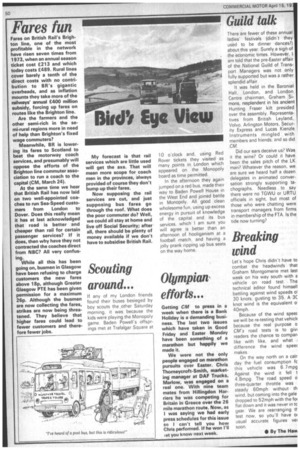Fares on British Rail's Brighton line, one of the most
Page 52

If you've noticed an error in this article please click here to report it so we can fix it.
profitable in the network have risen seven times from 1973, when an annual season ticket cost £213 and which today costs £489. Rural lines cover barely a tenth of the direct costs with no contribution to BR's gigantic overheads, and as inflation mounts they take more of the railways' annual £400 million subsidy, forcing up fares on routes like the Brighton line.
Are the farmers and the other semi-rich in the semi-rural regions more in need of help than Brighton's fixed wage commuters?
Meanwhile, BR is lowering its fares to Scotland to beat the motorway coach services, and presumably will oppose the efforts of the Brighton line commuter association to run a coach to the capital (CM, March 24).
At the same time we hear that British Rail has now laid on two well-appointed coaches to run Sea-Speed customers from London to Dover. Does this really mean it has at last acknowledged that road is better and cheaper than rail for certain passenger services? If it does, then why have they not contracted the coaches direct from NBC? All very confusing.
While all this has been going on, busmen in Glasgow have been refusing to charge customers the new fares above 18p, although Greater Glasgow PTE has been given permission for a maximum 26p. Although the busmen are now collecting the fares, strikes are now being threatened. They believe that higher fares could lead to fewer customers and therefore fewer jobs. My forecast is that rail services which are little used will get the axe. That will mean more scope for coach men in the provinces, always provided of course they don't bump up their fares.
Now supposing the rail services are cut, and just supposing bus fares go through the roof. What does the poor commuter do? Well, we could all stay at home and live off Social Security; after all, there should be plenty of money available if we don't have to subsidise British Rail.
Scouting around...
If. any of my London friends found their buses besieged by boy scouts the other Saturday morning, it was because the kids were playing the Monopoly game. Baden Powell's offsprings met at Trafalgar Square at 10 o'clock and, using Red Rover tickets they visited as many points in London which appeared on the Monopoly board as time permitted.
In the afternoon they again jumped on a red bus, made their way to Baden Powell House in the West End and joined battle in Monopoly. All good clean wholesome fun, using up excess energy in pursuit of knowledge of the capital and its bus services, which I am sure you will agree is better than an afternoon of hooliganism at a football match, and having a jolly prank ripping up bus seats on the way home.
Olympian,
efforts...
Getting CM to press in a week when there is a Bank Holiday is a demanding business. The last two issues which have taken in Good Friday and Easter Monday have been something of a marathon but happily we made it.
We were not the only people engaged on marathon pursuits over Easter. Chris Thomeycroft-Smith, marketing manager at OAF Trucks, Marlow, was engaged on a real one. With nine team mates from Hillingdon Harriers he was competing for Britain in Greece over the 26 mile marathon route. Now, as I was saying we had early press schedules for this issue so I can't tell you how Chris performed. If he won I'll :et you know next week. There are fewer of these annual ladies' festivals (didn't they used to be dinner dances?) about this year. Surely a sign of the economic times. However. I am told that the pre-Easter affair of the National Guild of Transport Managers was not only fully supported but was a rather splendid affair.
It was held in the Baronial Hall: London, and London Centre chairman, Graham Simons, resplendent in his ancient Hunting Fraser kilt presided over the assembly. Representatives from British Leyland, Volvo, Arlington Motors, Security Express and Lucas Kienzle Instruments mingled with members and friends: and so did CM.
Did our ears deceive us? Was it the wine? Or could it have been the sales pitch of the LK man? Whatever the reason, we are sure we heard half a dozen delegates in animated conversation strongly supporting tachographs. Needless to say there were no TGWU or URTU officials in sight, but most of those who were chatting were transport managers from firms in membership of the FTA. Is the tide now turning?
Breaking wind
Let's hope Chris didn't have to combat the headwinds that Graham Montgomerie met last week on his way south with a vehicle on road test. The technical editor found himsell battling against wind speeds ol 30 knots, gusting to 35. A 3C knot wind is the equivalent cr 40mph.
Because of the wind speec we will be re-testing that vehick because the real purpose o CM's road tests is to givi readers the chance to compan like with like, and what difference the wind speet makes.
On the way north on a calr day the fuel consumption fc this vehicle was 6.7mpg Against the wind it fell t 4.8mpg. The road speed o three-quarter throttle was steady 60mph without th wind, but coming into the gale dropped to 52n-lph with the fo( flat down and it was never in tc gear_ We are rearranging test now, so you'll have at usual accurate figures vet soon.
• By The Haw




























































































